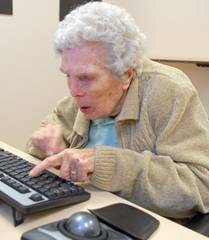|
Seniors Reach Digital Age: More Elderly are Taking Courses on Computer Usage to E-mail and Instant-message Their Friends and Family Members
By Tanika White, Baltimore Sun
March 14, 2008

Mary Taliaferro, 91, learned to type long ago, but she says the typewriter and computer keyboard are different.
Ninety-one-year-old Mary Taliaferro's last living friend lives in Hawaii. To stay in touch with her, Taliaferro has opened a Gmail account and is slowly but surely conquering the new-to-her world of electronic messaging.
It's slow going: Until this fall, Taliaferro didn't know what "sign ons" or "screen names" were.
"I really wasn't too interested," Taliaferro said of learning how to use e-mail at this late stage. "But I wanted to see what goes on today. My children are all on this stuff. They know all about it. Everybody is all on the computers. And I have a good friend, she's always writing me. She says, 'I wish you did computers. Then we could do it together.' So I thought I'd better learn."
Like many older Americans, Taliaferro grew up in an era that was virtually technology-free. There was no such thing as television when she was born; by the time she was 6, the hottest invention was the self-winding watch.
But computers and the Internet have become so ubiquitous that those seniors who once resisted adopting new technologies have come to appreciate - at the very least - the value of e-mail when it comes to staying connected with grandchildren, relatives and friends.
"More and more seniors are getting on the Internet and getting over the technophobia of using computers and technologies in general and the Internet in particular," said Majd Alwan, director of the Center for Aging Services Technologies in Washington.
In fact, Internet usage among seniors has increased from 12 percent in 2000 to 37 percent last year, according to the Pew Internet and American Life Project, an initiative of the Pew Research Center.
To accommodate these new cyber-curious seniors, many senior centers, retirement communities and long-term care facilities have opened Internet cafes or begun offering classes to teach older Americans what many of them swore they would never need.
Taliaferro, for example, is a student in an Internet class at Keswick Multi-Care Center, a nursing home and assisted-living facility in Roland Park.
Each week, she and 11 other seniors - all of whom use wheelchairs - spend 45-minutes learning how to operate a trackball (a senior-friendly mouse), figuring out what words like "click" and "backspace" mean, and learning other basic Internet skills.
"None of them have ever been on a computer before," said Patrice Herold, a full-time clinical information systems specialist at Keswick who started teaching the class in November during her spare time. "Some of them remember typing, but then again, some of them have never typed. A lot of them didn't even know what a keyboard is."
But all of the seniors in the class - some of whom have severe health problems - are determined to overcome such challenges to keep in contact with loved ones.
"I write to my sister, she lives out in Randallstown," said Delores Pittman, a Keswick resident in Herold's class. "It's hard to get her on the phone. I had to learn how to send messages."
Pittman is in her 60s, but she suffers from polyneuropathy - a neurological disorder that causes her arms and hands to shake. It has also made her voice unsteady, so talking has become more and more difficult.
For Pittman, e-mail is preferable to telephone conversations, despite trouble with controlling her muscles. Periodically, she will practice what she learns in the class at Keswick's small Internet cafe.
"It depends on how calm my nerves are," Pittman said. "Because I have trouble with the mouse."
Though it takes a considerable amount of time to do, Pittman also e-mails another Keswick resident - a certain debonair suitor - who sends short messages back, usually complimenting Pittman on her beauty.
When asked about his messages, Pittman smiles.
"We're just good friends," she says, coyly.
Being connected on the Internet - whether it is with friends, family members or secret suitors - can help keep seniors such as Taliaferro and Pittman feeling young, said Dale Anderson, a retired doctor and author of Never Act Your Age, a 2003 book that looks at the use of humor, laughter and play as people get older.
"I think it is adding so much to the health of our seniors," Anderson said. "I'll see people who are in their 80s or 90s, and they'll say, 'Oh my gosh, I've never felt so young. I'm sitting around all these young people - they're on the Web and I'm on the Web. I'm talking to my granddaughter and she's off in Europe.' Anything you can do to connect - it has taken some of the elderly and it has helped them to be more well-derly."
In fact, said Herold, the students in her Internet class have found particular enjoyment in one popular e-mail shorthand she taught them in class: LOL.
"Now that they know what that is," Herold said, "they all laugh at that now."
Out loud.
More Information on US Elder Rights Issues
Copyright © Global Action on Aging
Terms of Use |
Privacy Policy | Contact
Us
|



